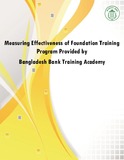Measuring effectiveness of foundation training program provided by Bangladesh Bank training academy

View/
Date
2016-01-21Publisher
BRAC UniversityAuthor
Rifat-Bin-Rahman, Md.Metadata
Show full item recordAbstract
Bangladesh Bank as the central bank of Bangladesh is playing an essential role in advancing the
economy’s smooth functioning, creating business friendly policies and protecting the economy in
times of crisis. For the best performance in today’s ever changing world, Bangladesh Bank’s
employees are required to be given adequate training so that they can adapt with changes and
keep themselves updated with latest knowledge about the banking sector and the economy. As
training incurs a lot of cost and in today’s world cost must be justified so training must be
evaluated to check whether its benefits overshadow the cost or not. Bangladesh Bank Training
Academy (BBTA) provides around 80 training programs among which the most prominent one
is “Foundation Training”.
Training is an attempt to improve current and future performance of employees. Development
refers to those learning opportunities designed to help employee’s growth. Here in central bank,
Assistant Directors are recruited in an entry level position where they come from different
educational background. Most of them do not even have any business background to understand
the banking industry. Some of them are fresh graduate who have no experience. Through
foundation training program, they are expected to come at a same knowledge level and skill.
The main objective of the study is to evaluate the effectiveness of foundation training program
that is provided to Assistant Directors by BBTA. Sometimes it is very much difficult to measure
the outcome by rating or scoring and expressing the result numerically where issues are
subjective like knowledge, skill or even behavior. So here, I choose Kirkpatrick’s four level
evaluation model which is considered to measure the effectiveness and performance
improvement of an employee and it is judged subjectively.
For getting this evaluation done, a qualitative study has been done though interview with 10
employees of Bangladesh Bank. Two of them already became supervisor of other Assistant
Directors which make this study more reliable and resourceful. Here, post-test questionnaire has
been used and participants were asked 7 questions which falls under different levels of Kirkpatrick’s model. Questions were designed from the perspective of both the supervisors and
trainees.
Level 1 Evaluation found that Participants’ reaction is totally positive towards the foundation
training program. Level 2 evaluation says participant get to know about the style and unique
functioning of Bangladesh Bank from the perspective of central bank’s overview and country’s
economy. Level 3 Evaluation proved the trainees becomes more matured as a central banker and
they get professionalism in their daily activity and finally Level 4 Evaluation accomplished that
foundation training programs’ objective has been served through communicating its core values
with employees.
In few instances, limitations are faced due to the characteristics of the training courses. For such
a case, a rational solution has been developed as practicable. I believe, current training function
requires alteration and adjustments in coming days so this valuation report may help them for
further advancement.
